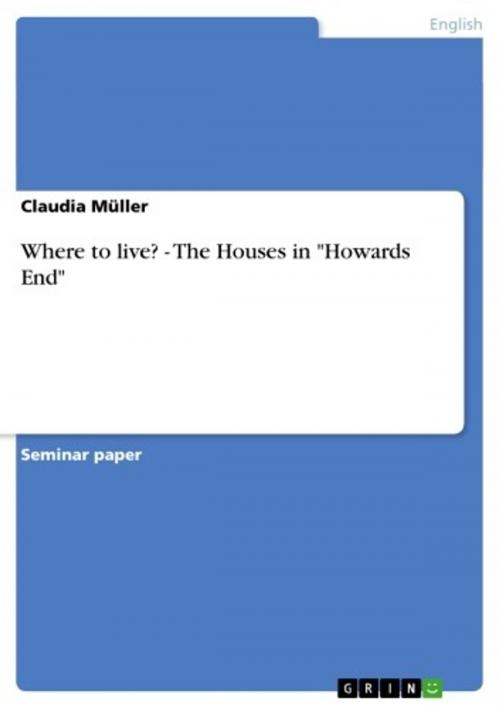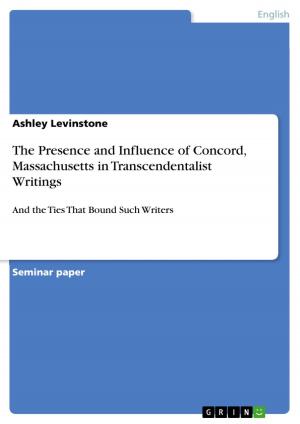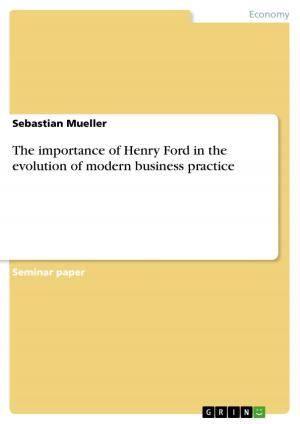Where to live? - The Houses in 'Howards End'
The Houses in 'Howards End'
Fiction & Literature, Literary Theory & Criticism, British| Author: | Claudia Müller | ISBN: | 9783638382526 |
| Publisher: | GRIN Publishing | Publication: | June 1, 2005 |
| Imprint: | GRIN Publishing | Language: | English |
| Author: | Claudia Müller |
| ISBN: | 9783638382526 |
| Publisher: | GRIN Publishing |
| Publication: | June 1, 2005 |
| Imprint: | GRIN Publishing |
| Language: | English |
Seminar paper from the year 2004 in the subject English Language and Literature Studies - Literature, grade: 1,0, Humboldt-University of Berlin, course: Masculinity in the Late Victorian and Early Edwardian Novel, 10 entries in the bibliography, language: English, abstract: The paper 'Where to live - The Houses in Howards End' shows in which way E. M. Forster associates certain housing conditions with special types of character, in how far he thinks that housing conditions influence the way people are and behave and what conclusion he draws as to where to live. Basically, there are three different types of houses portrayed in the novel: the dwelling place of the urban lower middle class, London town houses, and country houses. It can be argued that there are differences between these types of houses and also that the narrator differs the houses' quality among themselves. Taking the city - country dichotomy as a starting point, the paper discusses the standpoint Forster takes towards the quality of these houses when he shows that they are 'alive' or not (whether they possess life, spirit or souls).It is explained in which way the economic status of the main characters of the novel (the Schlegels, the Wilcoxes and the Basts) is reflected in their respective housing-conditions and what position Forster takes towards housing at the beginning of the twentieth century in general. The paper also relates to some of the current views and popular concepts of Forster's time on the different housing conditions of people. Taking a look at some general statements about living in the city versus living in the country and living in flats versus living in houses, it is explained what the narrator's preferences are as to where one should live. The paper discusses in how far this attitude is reflected in the narrator's decision about the ideal place to live for his heroine Margaret Schlegel and in how far this solution is a realistic one.
Seminar paper from the year 2004 in the subject English Language and Literature Studies - Literature, grade: 1,0, Humboldt-University of Berlin, course: Masculinity in the Late Victorian and Early Edwardian Novel, 10 entries in the bibliography, language: English, abstract: The paper 'Where to live - The Houses in Howards End' shows in which way E. M. Forster associates certain housing conditions with special types of character, in how far he thinks that housing conditions influence the way people are and behave and what conclusion he draws as to where to live. Basically, there are three different types of houses portrayed in the novel: the dwelling place of the urban lower middle class, London town houses, and country houses. It can be argued that there are differences between these types of houses and also that the narrator differs the houses' quality among themselves. Taking the city - country dichotomy as a starting point, the paper discusses the standpoint Forster takes towards the quality of these houses when he shows that they are 'alive' or not (whether they possess life, spirit or souls).It is explained in which way the economic status of the main characters of the novel (the Schlegels, the Wilcoxes and the Basts) is reflected in their respective housing-conditions and what position Forster takes towards housing at the beginning of the twentieth century in general. The paper also relates to some of the current views and popular concepts of Forster's time on the different housing conditions of people. Taking a look at some general statements about living in the city versus living in the country and living in flats versus living in houses, it is explained what the narrator's preferences are as to where one should live. The paper discusses in how far this attitude is reflected in the narrator's decision about the ideal place to live for his heroine Margaret Schlegel and in how far this solution is a realistic one.















